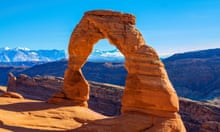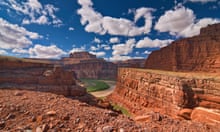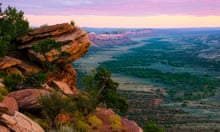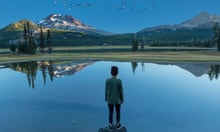America’s national parks need a staggering $11.5bn worth of overdue road and infrastructure repairs. But with the proposed National Park Service budget slashed by almost $400m, the Trump administration says it will turn to privatizing public park services to address those deferred maintenance costs.
“I don’t want to be in the business of running campgrounds,” Interior Secretary Ryan Zinke said at a meeting of the Recreation Vehicle Industry Association in Washington this month. This came after Donald Trump proposed cutting the Department of the Interior budget by 13%.
But some public lands advocates are concerned that privatization would drive up costs for visitors and put the egalitarian nature of visiting a park out of reach for some.
The park service did consider privatizing more services during the 1980s and 1990s, says John Garder, director of budget and appropriations of the National Parks Conservation Association. He says what the agency discovered is that, “for most part, you can’t privatize services significantly without having to raise the cost of visitation”.
If you’ve visited a national park, especially a busy one, such as Yosemite or Grand Canyon, there is a good chance you’ve patronized a private operator. Concessionaires operate a range of services including lodging, restaurants and transportation – ferries to Alcatraz and Liberty islands, for example. All told, the NPS has issued private concession contracts at 100 places within the park system.
In recent years, disagreements over park contracts have led to costly lawsuits for the park service. A provision in the contract offered to concessionaires allows them to recoup their investments in NPS facilities at the end of a contract period. This provision can also make the bidding process for new contracts extremely messy.
Xanterra Parks and Resorts, owned by conservative billionaire Philip Anschutz, is one of the biggest concessionaires in the park system and has provided lodging and other services in the Grand Canyon since 1968. In that year, it acquired Fred Harvey Company, which had served the Grand Canyon since 1905. By the time its contract neared its end in 2015, the company said it had invested $200m in facilities upgrades, which any new bidder would need to pay off before turning a profit.
Unable to attract new bidders, the park system scraped together half of that $200m. It cut $25m from its operating budget at the Grand Canyon, and borrowed nearly $50m from other parks and another $25m from Washington, according to an investigation from National Parks Traveler.
Xanterra filed suit against the park system, saying the park’s decision to open bidding for the contract was a “surprise” and that other changes to the contract forced Xanterra to secure new lodging for its employees in the Grand Canyon. The suit was dismissed when the park service expanded Xanterra’s contract for a year. In late 2015 the company announced it had secured a new 15-year contract to operate concessions at the park.
Concessionaires also sometimes trademark the names of the facilities they run – and occasionally the parks themselves. In 2011, a private company won the trademark to Hot Springs National Park in Arkansas. Last year, after hotel operator Delaware North lost its contract to operate certain Yosemite facilities, it tried to charge the subsequent concessionaire $51m to use its trademarked names and images. The concessionaire had trademarked the image of Half Dome and even the phrase Yosemite National Park. When the NPS refused to enforce that request, Delaware North sued the agency. The lawsuit is ongoing.
It would take a tremendous increase in such contracts to generate enough revenue to help the park system. Each year, concessionaires generate roughly $1.5bn in sales from their NPS operations. In 2016, the park service received $113m in franchise fees from these companies, as well as $30.8m in other payments including maintenance fees. Revenue from concessions makes up only around 1% of the current deferred maintenance costs.
Garder says focusing on privatization of park operations is a “misguided approach to dealing with the park service’s funding woes”. Instead, he believes it would be more beneficial for Zinke to provide a budget that increases funding for deferred maintenance and park staff, particularly rangers, who play an important role in engaging with visitors.
A big investment is not unprecedented. As part of the Mission 66 campaign from 1956 to 1966, designed to modernize the parks, Congress invested $1bn in infrastructure improvements. That would be $7bn-8bn in today’s dollars, Garder says.
But despite his bullishness on infrastructure spending, Trump has proposed cutting the NPS budget by nearly $400m, which will force job cuts. At the same time, Trump supports more oil and gas extraction on public lands, including in the Arctic National Wildlife Refuge.
At a meeting of the Committee on Energy and Natural Resources this week, Zinke said reopening oil exploration that the Obama administration stopped could refill federal coffers, generating more than enough federal money to address the NPS maintenance backlog.
But Chris Saeger, director of the Western Values Project, a watchdog group focused on energy development in the west, says the Trump administration hasn’t demonstrated a desire to reinvest that revenue in the park system. “It seems irresponsible to starve the [NPS] maintenance backlog at the same time they’re increasing oil and gas production,” he says.
Saeger, who lives in Montana’s Flathead Valley, near Glacier National Park, worries that an uptick in privately operated campgrounds would mean fewer affordable camping options for park visitors.
“Living here in a community that relies on a national park, [I know] concessionaires play a big role,” he says. “And in peak season, hotel rooms can cost hundreds of dollars a night. That’s an option for some people. But the National Park System is supposed to be enjoyable by all people.”








Comments (…)
Sign in or create your Guardian account to join the discussion